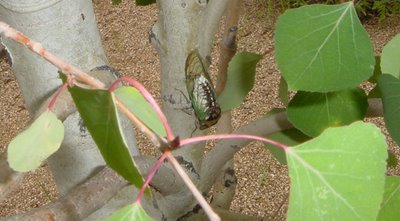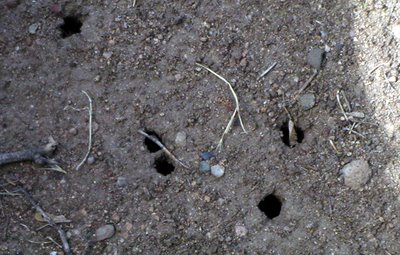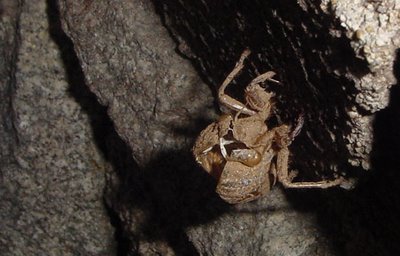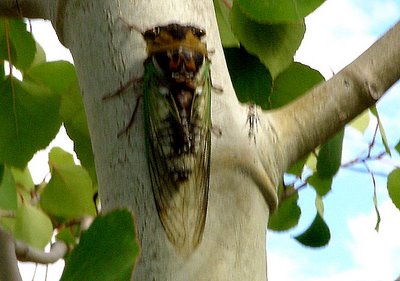
It's already October and still we hear the song of the cicada. It's not nearly as piercing as earlier in the season, when the shrill noise could overwhelm that of a highly amped rock group. Especially hard on one's ears when trying to take close-up pictures of the fellows and all the bugs in the nearby trees begin their shout for ladies to fly over to get acquainted.

I tried to photograph the major phases of the life cycle -- but no dang luck finding females slitting small limbs to insert their eggs. Didn't find any such pictures on the web, when I went to The Google. However, the Arizona Ag Dept. describes the Life of the Cicada succinctly:
 The cicadas spend most of their lives as immatures, feeding underground on the roots of trees or other perennials. The immatures move out of the soil during summer evenings, starting in June about Father's Day. They leave behind holes about one half inch in diameter. They crawl up nearby tree trunks, plants or buildings and cling there. If you watch, eventually the back of the nymph begins to split open and the adult winged cicada emerges. Homeowners often find the leftover skins attached to foundations or trees.
The cicadas spend most of their lives as immatures, feeding underground on the roots of trees or other perennials. The immatures move out of the soil during summer evenings, starting in June about Father's Day. They leave behind holes about one half inch in diameter. They crawl up nearby tree trunks, plants or buildings and cling there. If you watch, eventually the back of the nymph begins to split open and the adult winged cicada emerges. Homeowners often find the leftover skins attached to foundations or trees. Cicada adults live three to four weeks. After mating, the female cuts open twigs with her saw-like egg-laying apparatus, and deposits her eggs in the slits. When the eggs hatch, the nymphs drop to the ground and burrow into the soil in search of food.
Cicada adults live three to four weeks. After mating, the female cuts open twigs with her saw-like egg-laying apparatus, and deposits her eggs in the slits. When the eggs hatch, the nymphs drop to the ground and burrow into the soil in search of food.My husband and I were out walking just north of the Sharlot Hall grounds with a video camera many years ago and were lucky enough to catch egg laying action. This summer, I pawed through a number of smaller trees and limbs on several occasions, hoping to see the same. Caught the males vibrating their abdomens -- but not a lady in a carload. By the way, if the song of the cicada grabs your heart, you can listen at any season over at Nature Songs (the web site of Doug von Gaussig, the mayor of Clarkdale). Our 22 varieties of Arizona cycad usually spend 3-4 years underground, not the classic 7 or 17, just FYI.
Internationally, cicadas in their 2400 varieties have caught the imagination of people around the world from Biblical times to today. This site tells about Chinese cicada lore, while a modern offers his own web site in honor of the insect.
Later Note: Would you believe a cicada blog? Or cicada T-shirt? In this modern hyper-specialized, linked world, of course you would! I just found them.
Our cat, Pepper, seems to think they are really spiffy toys, and brings them inside on a pretty regular basis...along with vols, which play dead for a long time and usually wake up right about in mid-swirl in the toilet. Ouch!
ReplyDeleteI haven't seen as many cicadas on the ground this year, for some reason. Max cat did find a praying mantis the other day & tried to play with it. But every time the cat pawed delicately at the critter, it snapped its jaw at him. He gave up and the mantis flew away.
ReplyDeleteWe don't get them as prolific up north. I hear one once in awhile but can never find the noisy little bug. I did get one of those hand painted T-shirts, very nice. And thanks for commenting on my photos.
ReplyDeleteBrave manis...I guess the praying worked!
ReplyDelete